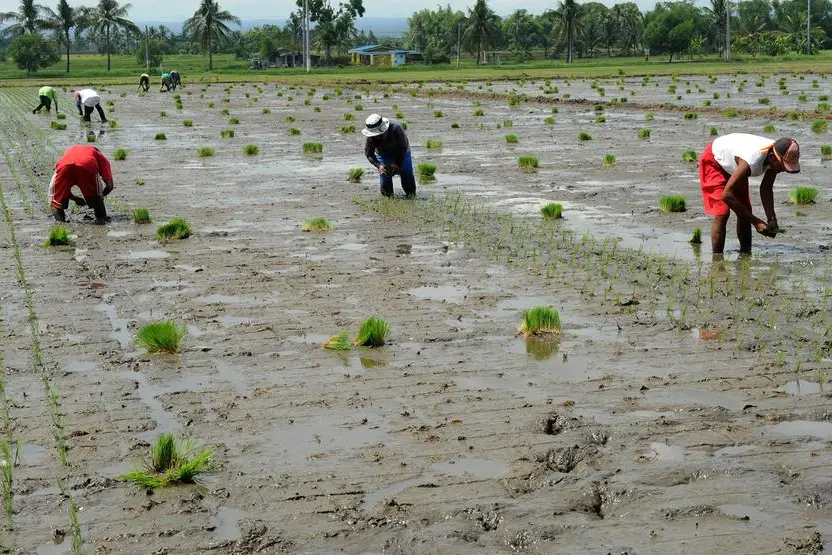PHOTO
The Philippines wants to increase its agricultural exports to Japan as the government continues to push for zero tariffs for bananas, as well as the revival of shipment of local mangoes to the East Asian country.
The Department of Agriculture (DA) is already coordinating with the Department of Trade and Industry to secure a preferential tariff rate for Philippine bananas, which is under threat from rising shipments from Cambodia, Laos, Mexico and Vietnam. Japan gives a zero or preferential tariff for bananas coming from these countries.
'Philippine bananas are staples for Japanese consumers, accounting for 22 percent of their food basket. The Philippines proximity to Japan allows the country to deliver low-cost bananas and other tropical fruits compliant with Japanese food standards,' the DA said.
Based on Japan's tariff schedule as of Jan. 1, 2024, bananas imported from the Philippines from Oct. 1 to March 31 are imposed a tariff of 18 percent. This is higher than the eight percent tariff slapped on Philippine bananas during the summer season or from April 1 to Sept. 30.
Agriculture Secretary Francisco Tiu Laurel Jr. said the review of the Japan-Philippines Economic Partnership Agreement (JPEPA) would be a good initial opportunity 'to discuss the Philippines' appeal for lower tariff on bananas.'
The DA said it is also seeking to revive the Japanese market for Philippine mangoes, whose export had declined sharply since Japan adopted in 2011 stricter sanitary and photo-sanitary standards, especially the maximum residue limit.
During the ASEAN-Japan Summit in December, Laurel led ceremonies to mark the re-entry of Philippine mangoes to Japan, with the presentation of the tropical fruit to his Japanese counterpart.
Agriculture Attache Aleli Maghirang is hopeful that fresh Davao mangoes' re-entry into the Japanese market would spur 'greater confidence to our exporters to continue supplying to Japan.'
Laurel has ordered the immediate improvement of testing laboratories to align the Philippine food code with those of importing countries like Japan, and the enhancement of farming practices and production of good quality planting materials for expansion and replanting.
The DA wants a bigger slice of Japan's food market-the fifth largest in the world with total purchases of agricultural products worth $87 billion in 2022 alone.
In the first nine months of 2023, Philippine agriculture exports to Japan reached $679 million. In 2022, total agricultural exports to Japan reached $916 million, higher than the $894.4 million in the previous year.
In line with its goal of increasing the agriculture exports to Japan, the DA has scheduled the inaugural meeting of the Philippines-Japan Joint Committee on Agriculture in the second quarter of the year.
'This very first meeting of the joint agriculture committee of the two Asian neighbors here in the Philippines will provide an avenue to follow through the agri-fisheries trade and market access discussions started in Japan,' Laurel said.
In February last year, the Philippines - through the DA and Japan's Ministry of Agriculture, Forestry and Fisheries - signed the memorandum of cooperation on agricultural cooperation, which created the Philippines-Japan Joint Committee on Agriculture.
Laurel said the meeting would be an opportunity to discuss technical and project collaborations under the memorandum of cooperation.
He emphasized that the upcoming meeting is a follow up to his discussions with Japanese officials and businessmen in December, when he accompanied President Marcos at the ASEAN-Japan Summit.
The meetings hope to open more export opportunities for Philippine fish and tropical fruits, such as pineapple, bananas, avocado, mangoes, durian, mangosteen and okra.
Laurel said the upcoming joint committee meeting would also be an opportunity to discuss the Asean-Japan MIDORI Cooperation Plan.
In October, together with other members of the Association of Southeast Asian Nations, the Philippines signed the MIDORI plan, which aims to promote cooperation projects using Japanese technology and sharing experiences to build resilient and sustainable agriculture and food systems for future food security.
Copyright © 2022 PhilSTAR Daily, Inc Provided by SyndiGate Media Inc.





















